Vladimir Putin has arrived for the anniversary summit of the Belt and Road Initiative (BRI). Beijing is not only literally rolling out the red carpet for its “dear friend” – who has an international arrest warrant out on him for war crimes. This is also because the BRI Forum’s guest list is not all that impressive, explains Michael Radunski: Government representatives from 130 countries are traveling to the event, an impressive number at first glance. However, there are no G7 leaders and only Hungary’s Orbán from the EU. The immediate neighbors Japan, South Korea and India are also absent. And many South American and African countries have only sent ministers this time. All this strengthens the presence of the Russian guest of honor.
The figures of the latest GTAI analysis show how the New Silk Road Initiative is currently performing. In the second quarter of 2023, its focus shifted to China’s neighbors, especially in Southeast Asia. Finn Mayer-Kuckuk has analyzed where the main new BRI projects are currently located and how the initiative is faring in Europe.

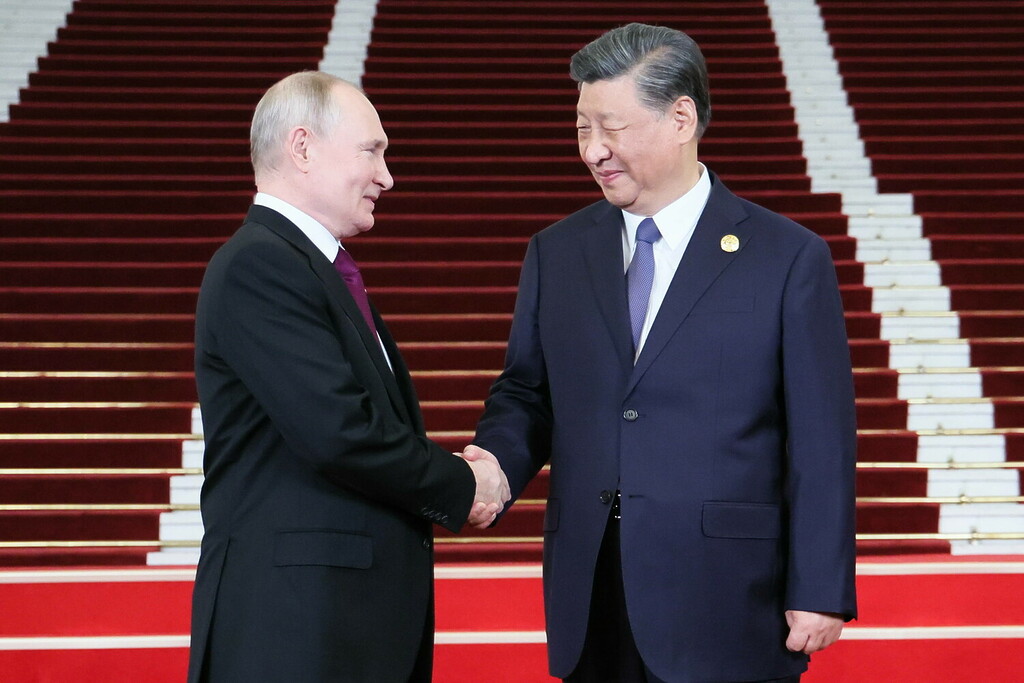
The red carpet was already ready when Vladimir Putin arrived at Beijing Capital International Airport on Tuesday. This is a matter of course for visits by heads of state and government. But it still seems strange in the case of the Russian president.
After all, Putin is a war criminal who is wanted by arrest warrant, according to the International Criminal Court. For China’s ruler Xi Jinping, on the other hand, he is a “dear friend” with whom he wants to achieve great changes in the world. Moreover, Putin is the most high-profile guest at Beijing’s Belt and Road Initiative (BRI) summit these days.
The two-day BRI forum is the largest international summit the People’s Republic has held since the end of zero-Covid. China seeks to present itself as a country that actively promotes economic development in many countries to benefit everyone involved. China as a selfless alternative to the egoistic USA.
It is Putin’s first international visit outside former Soviet Union countries since an international arrest warrant for alleged war crimes in Ukraine has been put out on him. Putin had no reason to fear that he would be arrested in China. The People’s Republic does not acknowledge the court in The Hague, nor does Russia.
Xi gives his friend Putin an international face. “The big stage in Beijing is without a doubt a good platform for Putin,” says Alexander Gabuyev, Director of the renowned Carnegie Russia Eurasia Center. Putin can show that he is by no means as isolated internationally as some heads of government in the West would like to see.
The sheer number of guests in Beijing is indeed impressive. Government representatives from around 130 countries are attending the tenth anniversary of the BRI. But a closer look at the guest list shows: No head of government from the G7 countries is present. Italy will even withdraw from the initiative at the end of the year. Only Hungary’s Prime Minister Viktor Orbán, who also immediately met with Putin, travels from the EU. Important countries from China’s neighborhood, such as Japan, South Korea and India, are also absent.
And this time, even many South American and African countries will only be represented by ministers, instead of heads of state and government as in the past. On the other hand, the Afghan Taliban will be in Beijing this time. This makes Putin by far the most important guest.
The priorities of the guest list invite strong criticism. “It speaks volumes about the state of the Belt and Road Initiative when the guest of honor is the leader of a dreadful regime that invades and annexes a neighboring country, commits war crimes in Ukraine and permanently violates the principles of the UN Security Council and the UN Charter,” says Russia-China expert Gabuyev.
Xi Jinping will nevertheless be pleased about the presence of his “dear friend.” After all, Putin adds a certain international glamor to the BRI Forum. Despite all the criticism, Putin is still the president of a country with a permanent seat and veto power in the UN Security Council, a nuclear power with interests and influence around the world.
Especially Putin is full of praise. In an interview with the Chinese state television CCTV shortly before the summit, Putin spoke highly of China’s party and state leader Xi. China is committed to common international goals and understands what is important in the world. Xi’s BRI project shows a desire for cooperation, Putin said. And what’s best: In all of this, no one is being forced into anything.
Putin presented Xi and himself as altruistic champions of a multipolar world order – in stark contrast to countries with a “heavy colonial legacy.” This refers to the states of the West. Putin now clearly sees Europe and the US as adversaries, while China continues to seek some cooperation, especially with the EU.
In any case, Putin is now back in Beijing for the first time since the Winter Olympics in February 2022. Back then, he and Xi proclaimed their “borderless partnership” to the world. A few days later, Putin invaded Ukraine with thousands of soldiers.
The fact that Xi still presents his friend Putin as a guest of honor at the BRI summit also says something about China. “Beijing is showing that it does not give a damn about a rules-based order,” Gabuyev says. On the contrary, China is ready to offer an alternative to all regimes in the world. The only condition: A friendly position vis-à-vis China is a must. Putin currently shows how this is done.
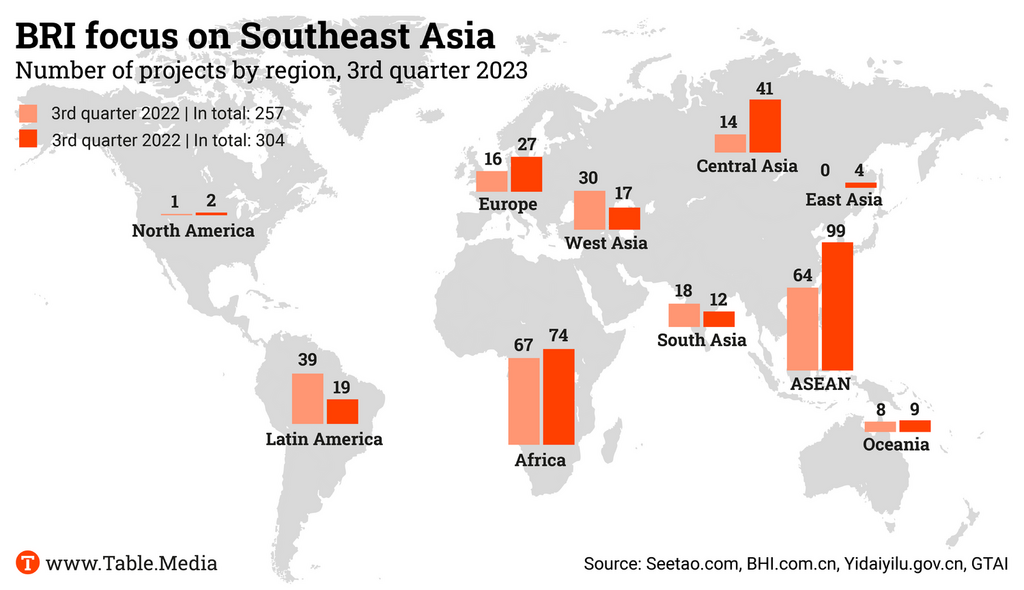
While the Belt and Road Summit in Beijing begins with much pomp and tall guests, the economic reality of the project once again shows signs of change. While the Arab region was still the focus in the first half of the year, most new projects have now been launched in Southeast Asia. “The BRI is moving closer to China proper,” is the verdict of Germany Trade & Invest (GTAI). GTAI continuously analyzes the activities along the new Silk Road.

With 99 new projects, most new projects have been launched in the ASEAN region of the alliance of Southeast Asian nations. Compared to last year, this is an increase of over 50 percent. Central Asia comes in second place, where the number of projects has increased sixfold since 2021.
In the Middle East, however, the number of new projects fell by 43 percent. However, this is not yet due to the war between Israel and Hamas: The data looks at the period from July to September, well before the terrorist attacks in Israel.
The most important new Silk Road projects started in the Philippines, Indonesia, Laos and Malaysia. The nature of the construction projects is very much in line with the BRI’s original idea of financing basic infrastructure:
With 27 projects, BRI activity in Europe remains comparatively weak, despite a slight recovery. Exemplary of the difficulties of Chinese investors in the EU are the problems of the rail project from Belgrade to Budapest. China has suspended all funding of the project for the time being.
The roughly two-billion-euro project was presumably also the topic of talks between Hungary’s Prime Minister Viktor Orbán on the sidelines of the BRI summit in Beijing.
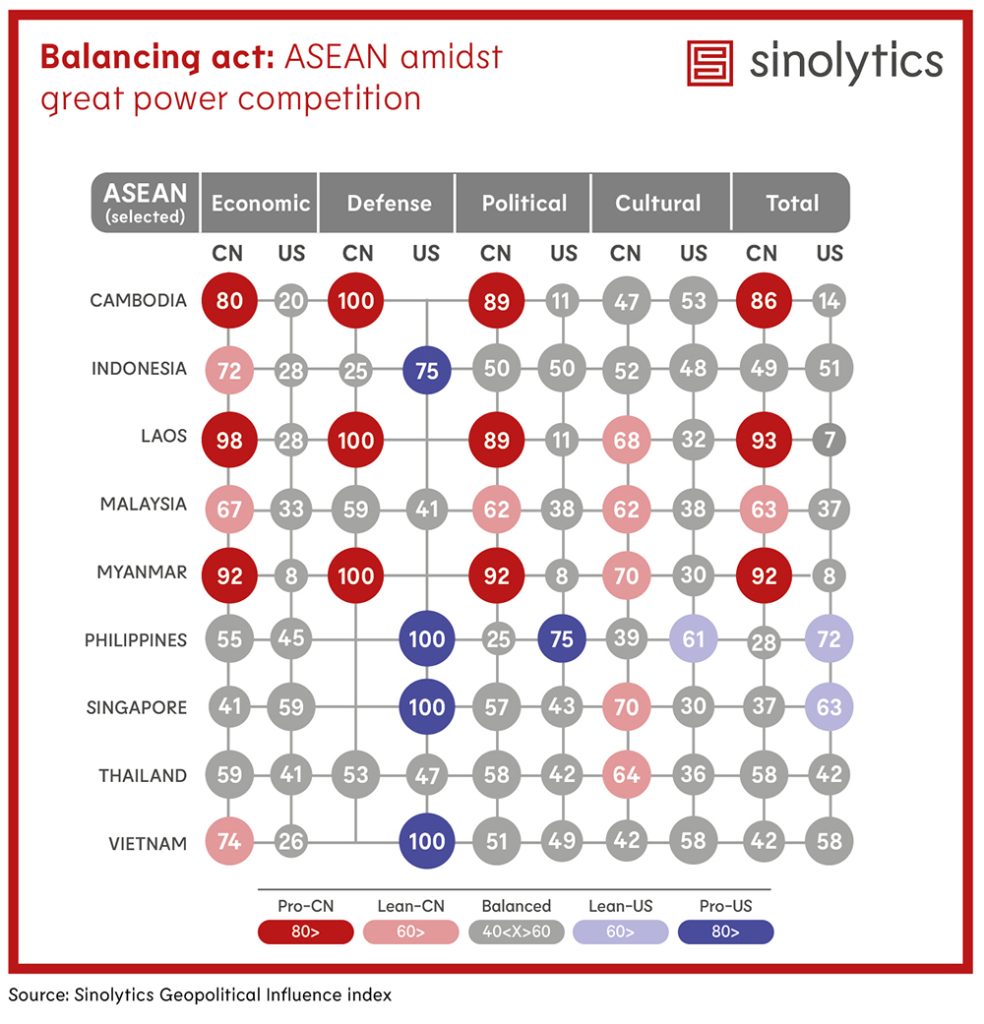
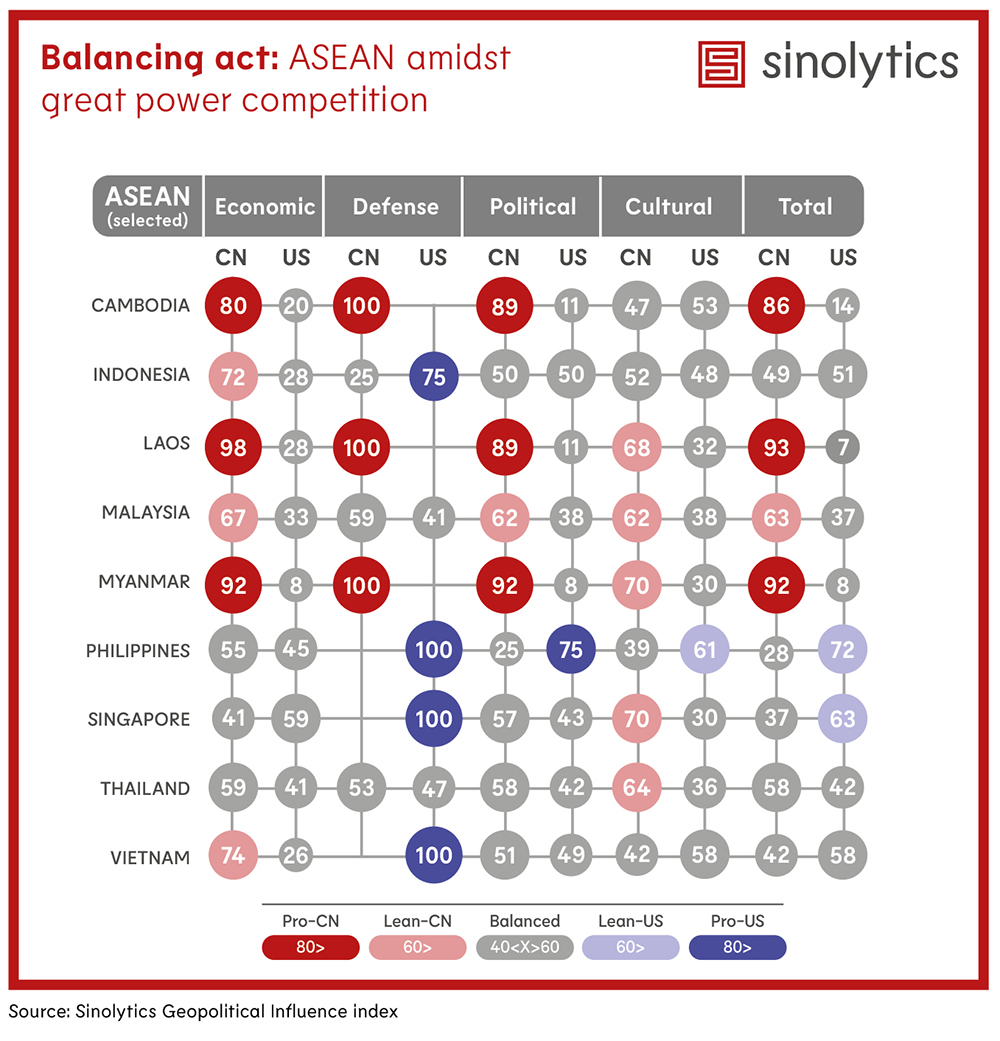
Sinolytics is a European research-based consultancy entirely focused on China. It advises European companies on their strategic orientation and concrete business activities in the People’s Republic.
The number of foreign buyers at China’s flagship export fair in Guangzhou, the Canton Fair, has almost returned to pre-pandemic levels, according to a report in business magazine Caixin. More than 50,000 foreign businesspeople from over 200 countries came to the fair on the first day, Sunday – significantly more than the first day of the fair’s spring edition. Registrations from Europe and North America were up 8.6 percent compared to the April fair, Caixin wrote, citing a fair spokesman. Registrations from Belt and Road Initiative countries increased by 11.2 percent.
The Canton Fair is considered an indicator of Chinese foreign trade. Before the pandemic, it usually attracted more than 200,000 buyers from around the world. The spring fair, held on-site for the first time this year after three years of being only virtual, was nevertheless attended by 129,000 buyers. They placed orders worth 21.7 billion US dollars, compared to 29.3 billion at the 2019 fall fair. China’s foreign trade has been slow since the pandemic, but recently showed early signs of a slight recovery. ck
The European Parliament calls on Beijing to increase transparency of Chinese distant water fishing. In a resolution on Tuesday, MEP criticized Chinese authorities for not being open about the People’s Republic’s distant water fleet. EU MPs stressed that the United Nations Food and Agriculture Organization (FAO) also insists on transparent data on Chinese fleets. Estimated numbers ranged between 2,900 to 16,966 vessels. China’s distant water fleet poses a “threat to the viability of the European fisheries sector.”
The EU Parliament also expressed concern that parts of the South China Sea, one of the most heavily fished seas in the world, were considered “domestic waters” by China. As such, vessels fishing there are not counted as part of the distant water fleet. “This has severe economic and labor repercussions for companies in the sector and throughout the supply chain,” the resolution says.
In a speech on Monday, EU Commissioner for Budget and Administration, Johannes Hahn, announced that the EU Commission would launch an investigation on so-called flags of convenience. This involves accusations of Chinese fishing vessels sailing under non-Chinese flags to facilitate illegal fishing. The lack of transparency, as well as subsidies to the Chinese fishing industry, would “significantly undermine the competitiveness of the EU internal market,” Hahn said.
China’s fisheries were also a topic in the debate on an import ban on products from forced labor. Recently published reports suggested that Uyghurs, for example, are forced to work on Chinese fishing vessels. On Monday evening, MEPs of the Foreign Affairs and Internal Trade Committees in the EU Parliament voted in favor of a draft under which corresponding products would be withdrawn from circulation at EU borders.
“Forced labor is a grave human rights violation,” Dutch parliamentary rapporteur Samira Rafaela said at a press conference Tuesday. The ban is essential to combat “modern slavery” in supply chains, she said. Member states and the EU Commission are to initiate investigations if they suspect forced labor in a product’s supply chain. If the suspicion is confirmed, goods will be seized at EU borders and withdrawn from the European market.
According to the parliamentary proposal, the Commission is to draw up a list of regions and economic sectors in which the risk of forced labor is particularly high. The burden of proof will be reversed if a product comes from such a region. Companies must then prove that forced labor is not involved in their supply chain. One affected region could be the Chinese province of Xinjiang. The EU Parliament still has to vote on the proposal before it can enter into negotiations with the other EU institutions. ari
A Chinese fighter jet intercepted a Canadian patrol plane and then dropped flares into its flight path. Based on Canadian information, the incident occurred off the coast of the People’s Republic in international airspace, Bloomberg reported Tuesday. Chinese fighter jets approached as close as five meters to the plane, which had journalists from the Canadian news network Global News on board. “They became very aggressive and to a degree we would deem it unsafe and unprofessional,” Major-General Iain Huddleston told the Canadian news outlet.
According to the government in Ottawa, the Canadian aircraft was part of a UN mission to enforce compliance with sanctions against North Korea. The sanctions have been in place for years because of North Korea’s nuclear program. According to the statement, the missions, which also include Japan, France and the United States, aim to detect sanctions “evasion activities, in particular ship-to-ship transfers of fuel and other commodities.” The operation is thus not directed against China, which supports most of the sanctions.
However, the incident once again highlights China’s frustration with Western military aircraft flying close to its coast. Time and again, dangerous incidents occur because of it. In May, a Chinese fighter jet evaded a US reconnaissance aircraft in close quarters, which the Pentagon called an “unnecessarily aggressive maneuver.” In 2022, Chinese fighter jets circled Canadian aircraft in the region and dropped small aluminum pieces in front of Australian aircraft, according to Bloomberg. ck
In an exclusive interview with Sky News Australia, Australian journalist Cheng Lei revealed for the first time the reason for her three-year detention in a Chinese prison: She reportedly violated the embargo on the Chinese government briefing by just a few minutes. “That in China, that is a big sin,” Cheng said. During the interview, she did not comment on the details of the briefing document she prematurely published.
Cheng was arrested in the summer of 2020 and found guilty in a non-public trial in April last year. She was accused of leaking state secrets abroad during her time as a presenter at Chinese foreign TV station CGTN. In Tuesday’s TV interview, Cheng said she was told during her six-month solitary confinement that she had undermined the state’s authority and “hurt the motherland” through her actions. cyb

Until he turned 32, Sebastian Hahn’s career path was straightforward: After studying business economics at Humboldt University in Berlin, he worked as a project manager in the logistics sector. It was challenging and exciting, but after each completed project, he had to start from scratch again. Over time, Sebastian Hahn began to feel that he was always doing the same thing.
During his studies, the Berlin native, born in 1982, spent two years learning Russian in Russia, Belarus and Ukraine. Now, he wondered why only high school and university students learn foreign languages and go abroad. His desire for fresh ideas and another adventure grew. Vietnam, Brazil, China – the country didn’t really matter; the decision to visit the People’s Republic was random. Sebastian Hahn quit his job and headed to China to spend a year learning the language. After a brief stop in Berlin, he returned to the Chinese tropical island of Hainan, where he earned another master’s degree. He liked life without the Berlin winter and decided to stay.
Hainan has a population of around ten million; the island is the size of Belgium and is the main island of China’s eponymous southernmost province. Until 1988, Hainan belonged to Guangdong Province and became an independent province and China’s largest special economic zone in the wake of Deng Xiaoping’s economic reforms. What many Chinese love most about Hainan is the tourist resort of Sanya on the south side, with its white sandy beaches and colorful aquatic world.
The island capital, Haikou, is located in the north. This is where Sebastian Hahn has been running the small language school Hainan Mandarin Academy for a few years. He offers in-depth Chinese courses and a small cultural program. The target group is mainly foreigners who come to Hainan for a few weeks and combine language lessons with a trip around the island.
Sebastian Hahn’s memories of his own first steps with the Chinese language are still fresh. He found the teaching materials he had to contend with awkward and far too ill-suited to his own learning needs. He came up with the idea of founding a language school and doing it better. Even though the concept is not exactly new, Hahn has a big advantage over language schools in Beijing or Shanghai: Tourists from 59 countries have been able to enter Hainan without a visa since 2018 and stay up to 30 days.
The special visa regime is one of many measures taken by the Chinese government to make Hainan attractive, not only as a tourism hotspot, but also as a business location. So far, the island province has been dominated by the agricultural sector. Coconut and pepper grow here, and fisheries also play a major role. But Hainan’s ambitions are big: The island is to attract massive foreign direct investment and boost China’s trade as part of the Silk Road Initiative. A separate customs zone will be established by the end of 2025, and Hainan will become the world’s largest free trade port by 2050.
This way, the island offers attractive conditions, including a reduced corporate tax rate. However, Hainan is not as well known as Guangzhou, Shanghai or Beijing. Sebastian Hahn sees an opportunity here – he would like to play a role in this structure himself.
So, in addition to the language school, he and a Chinese partner founded the Business Association of South China in Europe e.V. in 2019. With their contacts and knowledge of the region, the two hope to convince small and medium-sized German companies to come to the island. Sebastian Hahn recounts some successful projects in the medical field. They have referred doctors from Germany to clinics in Hainan to provide further training for medical staff on rehabilitating children and young people, for which there is considerable demand. An exchange in the other direction was also organized – doctors from Hainan went to the Berlin Charité for training programs. The two have organized the import of medical equipment such as X-ray machines and computer tomographs for clinics on the island. And soon, traditional Chinese medicine will also play a role.
Sebastian Hahn does not see the fact that the mood in Germany has become more skeptical about investing in China as problematic for his own plans. But he has another mainstay if things don’t go so well.
Alongside his language school and business association, he and his girlfriend run a café, and they will soon be opening a second one. As a small homage to his homeland, the café offers pork knuckle, but in small pieces so that they can be eaten with chopsticks. The café also offers another “typically German specialty” that is not actually a specialty: Beer latte macchiato, the invention of a Chinese employee. And so Sebastian Hahn has already achieved two things for sure on Hainan: His work is no longer always the same. And he has also escaped the Berlin winter. Julia Fiedler
Michael Kruppe has extended his contract as CEO with the Shanghai New International Expo Center (SNIEC) for another five years until 2028.
Song Kai is the new president of the China Football Association (CFA). He was previously head of the Liaoning Provincial Sports Authority. China launched a campaign against rampant corruption in the country’s soccer industry almost a year ago. Various soccer officials lost their posts during the crackdown.
Is something changing in your organization? Why not let us know at heads@table.media!
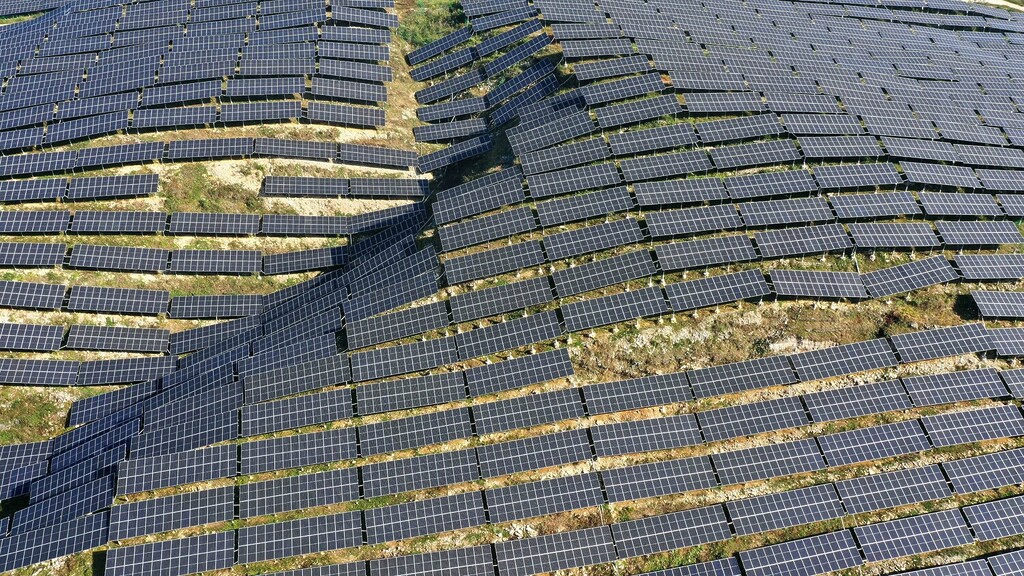
Climate protection can look this good – at least from a bird’s eye view: A view from far above of a photovoltaic power generation plant in the southwestern Chinese province of Guizhou. No country is currently expanding solar energy as rapidly as China.
Vladimir Putin has arrived for the anniversary summit of the Belt and Road Initiative (BRI). Beijing is not only literally rolling out the red carpet for its “dear friend” – who has an international arrest warrant out on him for war crimes. This is also because the BRI Forum’s guest list is not all that impressive, explains Michael Radunski: Government representatives from 130 countries are traveling to the event, an impressive number at first glance. However, there are no G7 leaders and only Hungary’s Orbán from the EU. The immediate neighbors Japan, South Korea and India are also absent. And many South American and African countries have only sent ministers this time. All this strengthens the presence of the Russian guest of honor.
The figures of the latest GTAI analysis show how the New Silk Road Initiative is currently performing. In the second quarter of 2023, its focus shifted to China’s neighbors, especially in Southeast Asia. Finn Mayer-Kuckuk has analyzed where the main new BRI projects are currently located and how the initiative is faring in Europe.


The red carpet was already ready when Vladimir Putin arrived at Beijing Capital International Airport on Tuesday. This is a matter of course for visits by heads of state and government. But it still seems strange in the case of the Russian president.
After all, Putin is a war criminal who is wanted by arrest warrant, according to the International Criminal Court. For China’s ruler Xi Jinping, on the other hand, he is a “dear friend” with whom he wants to achieve great changes in the world. Moreover, Putin is the most high-profile guest at Beijing’s Belt and Road Initiative (BRI) summit these days.
The two-day BRI forum is the largest international summit the People’s Republic has held since the end of zero-Covid. China seeks to present itself as a country that actively promotes economic development in many countries to benefit everyone involved. China as a selfless alternative to the egoistic USA.
It is Putin’s first international visit outside former Soviet Union countries since an international arrest warrant for alleged war crimes in Ukraine has been put out on him. Putin had no reason to fear that he would be arrested in China. The People’s Republic does not acknowledge the court in The Hague, nor does Russia.
Xi gives his friend Putin an international face. “The big stage in Beijing is without a doubt a good platform for Putin,” says Alexander Gabuyev, Director of the renowned Carnegie Russia Eurasia Center. Putin can show that he is by no means as isolated internationally as some heads of government in the West would like to see.
The sheer number of guests in Beijing is indeed impressive. Government representatives from around 130 countries are attending the tenth anniversary of the BRI. But a closer look at the guest list shows: No head of government from the G7 countries is present. Italy will even withdraw from the initiative at the end of the year. Only Hungary’s Prime Minister Viktor Orbán, who also immediately met with Putin, travels from the EU. Important countries from China’s neighborhood, such as Japan, South Korea and India, are also absent.
And this time, even many South American and African countries will only be represented by ministers, instead of heads of state and government as in the past. On the other hand, the Afghan Taliban will be in Beijing this time. This makes Putin by far the most important guest.
The priorities of the guest list invite strong criticism. “It speaks volumes about the state of the Belt and Road Initiative when the guest of honor is the leader of a dreadful regime that invades and annexes a neighboring country, commits war crimes in Ukraine and permanently violates the principles of the UN Security Council and the UN Charter,” says Russia-China expert Gabuyev.
Xi Jinping will nevertheless be pleased about the presence of his “dear friend.” After all, Putin adds a certain international glamor to the BRI Forum. Despite all the criticism, Putin is still the president of a country with a permanent seat and veto power in the UN Security Council, a nuclear power with interests and influence around the world.
Especially Putin is full of praise. In an interview with the Chinese state television CCTV shortly before the summit, Putin spoke highly of China’s party and state leader Xi. China is committed to common international goals and understands what is important in the world. Xi’s BRI project shows a desire for cooperation, Putin said. And what’s best: In all of this, no one is being forced into anything.
Putin presented Xi and himself as altruistic champions of a multipolar world order – in stark contrast to countries with a “heavy colonial legacy.” This refers to the states of the West. Putin now clearly sees Europe and the US as adversaries, while China continues to seek some cooperation, especially with the EU.
In any case, Putin is now back in Beijing for the first time since the Winter Olympics in February 2022. Back then, he and Xi proclaimed their “borderless partnership” to the world. A few days later, Putin invaded Ukraine with thousands of soldiers.
The fact that Xi still presents his friend Putin as a guest of honor at the BRI summit also says something about China. “Beijing is showing that it does not give a damn about a rules-based order,” Gabuyev says. On the contrary, China is ready to offer an alternative to all regimes in the world. The only condition: A friendly position vis-à-vis China is a must. Putin currently shows how this is done.

While the Belt and Road Summit in Beijing begins with much pomp and tall guests, the economic reality of the project once again shows signs of change. While the Arab region was still the focus in the first half of the year, most new projects have now been launched in Southeast Asia. “The BRI is moving closer to China proper,” is the verdict of Germany Trade & Invest (GTAI). GTAI continuously analyzes the activities along the new Silk Road.

With 99 new projects, most new projects have been launched in the ASEAN region of the alliance of Southeast Asian nations. Compared to last year, this is an increase of over 50 percent. Central Asia comes in second place, where the number of projects has increased sixfold since 2021.
In the Middle East, however, the number of new projects fell by 43 percent. However, this is not yet due to the war between Israel and Hamas: The data looks at the period from July to September, well before the terrorist attacks in Israel.
The most important new Silk Road projects started in the Philippines, Indonesia, Laos and Malaysia. The nature of the construction projects is very much in line with the BRI’s original idea of financing basic infrastructure:
With 27 projects, BRI activity in Europe remains comparatively weak, despite a slight recovery. Exemplary of the difficulties of Chinese investors in the EU are the problems of the rail project from Belgrade to Budapest. China has suspended all funding of the project for the time being.
The roughly two-billion-euro project was presumably also the topic of talks between Hungary’s Prime Minister Viktor Orbán on the sidelines of the BRI summit in Beijing.


Sinolytics is a European research-based consultancy entirely focused on China. It advises European companies on their strategic orientation and concrete business activities in the People’s Republic.
The number of foreign buyers at China’s flagship export fair in Guangzhou, the Canton Fair, has almost returned to pre-pandemic levels, according to a report in business magazine Caixin. More than 50,000 foreign businesspeople from over 200 countries came to the fair on the first day, Sunday – significantly more than the first day of the fair’s spring edition. Registrations from Europe and North America were up 8.6 percent compared to the April fair, Caixin wrote, citing a fair spokesman. Registrations from Belt and Road Initiative countries increased by 11.2 percent.
The Canton Fair is considered an indicator of Chinese foreign trade. Before the pandemic, it usually attracted more than 200,000 buyers from around the world. The spring fair, held on-site for the first time this year after three years of being only virtual, was nevertheless attended by 129,000 buyers. They placed orders worth 21.7 billion US dollars, compared to 29.3 billion at the 2019 fall fair. China’s foreign trade has been slow since the pandemic, but recently showed early signs of a slight recovery. ck
The European Parliament calls on Beijing to increase transparency of Chinese distant water fishing. In a resolution on Tuesday, MEP criticized Chinese authorities for not being open about the People’s Republic’s distant water fleet. EU MPs stressed that the United Nations Food and Agriculture Organization (FAO) also insists on transparent data on Chinese fleets. Estimated numbers ranged between 2,900 to 16,966 vessels. China’s distant water fleet poses a “threat to the viability of the European fisheries sector.”
The EU Parliament also expressed concern that parts of the South China Sea, one of the most heavily fished seas in the world, were considered “domestic waters” by China. As such, vessels fishing there are not counted as part of the distant water fleet. “This has severe economic and labor repercussions for companies in the sector and throughout the supply chain,” the resolution says.
In a speech on Monday, EU Commissioner for Budget and Administration, Johannes Hahn, announced that the EU Commission would launch an investigation on so-called flags of convenience. This involves accusations of Chinese fishing vessels sailing under non-Chinese flags to facilitate illegal fishing. The lack of transparency, as well as subsidies to the Chinese fishing industry, would “significantly undermine the competitiveness of the EU internal market,” Hahn said.
China’s fisheries were also a topic in the debate on an import ban on products from forced labor. Recently published reports suggested that Uyghurs, for example, are forced to work on Chinese fishing vessels. On Monday evening, MEPs of the Foreign Affairs and Internal Trade Committees in the EU Parliament voted in favor of a draft under which corresponding products would be withdrawn from circulation at EU borders.
“Forced labor is a grave human rights violation,” Dutch parliamentary rapporteur Samira Rafaela said at a press conference Tuesday. The ban is essential to combat “modern slavery” in supply chains, she said. Member states and the EU Commission are to initiate investigations if they suspect forced labor in a product’s supply chain. If the suspicion is confirmed, goods will be seized at EU borders and withdrawn from the European market.
According to the parliamentary proposal, the Commission is to draw up a list of regions and economic sectors in which the risk of forced labor is particularly high. The burden of proof will be reversed if a product comes from such a region. Companies must then prove that forced labor is not involved in their supply chain. One affected region could be the Chinese province of Xinjiang. The EU Parliament still has to vote on the proposal before it can enter into negotiations with the other EU institutions. ari
A Chinese fighter jet intercepted a Canadian patrol plane and then dropped flares into its flight path. Based on Canadian information, the incident occurred off the coast of the People’s Republic in international airspace, Bloomberg reported Tuesday. Chinese fighter jets approached as close as five meters to the plane, which had journalists from the Canadian news network Global News on board. “They became very aggressive and to a degree we would deem it unsafe and unprofessional,” Major-General Iain Huddleston told the Canadian news outlet.
According to the government in Ottawa, the Canadian aircraft was part of a UN mission to enforce compliance with sanctions against North Korea. The sanctions have been in place for years because of North Korea’s nuclear program. According to the statement, the missions, which also include Japan, France and the United States, aim to detect sanctions “evasion activities, in particular ship-to-ship transfers of fuel and other commodities.” The operation is thus not directed against China, which supports most of the sanctions.
However, the incident once again highlights China’s frustration with Western military aircraft flying close to its coast. Time and again, dangerous incidents occur because of it. In May, a Chinese fighter jet evaded a US reconnaissance aircraft in close quarters, which the Pentagon called an “unnecessarily aggressive maneuver.” In 2022, Chinese fighter jets circled Canadian aircraft in the region and dropped small aluminum pieces in front of Australian aircraft, according to Bloomberg. ck
In an exclusive interview with Sky News Australia, Australian journalist Cheng Lei revealed for the first time the reason for her three-year detention in a Chinese prison: She reportedly violated the embargo on the Chinese government briefing by just a few minutes. “That in China, that is a big sin,” Cheng said. During the interview, she did not comment on the details of the briefing document she prematurely published.
Cheng was arrested in the summer of 2020 and found guilty in a non-public trial in April last year. She was accused of leaking state secrets abroad during her time as a presenter at Chinese foreign TV station CGTN. In Tuesday’s TV interview, Cheng said she was told during her six-month solitary confinement that she had undermined the state’s authority and “hurt the motherland” through her actions. cyb

Until he turned 32, Sebastian Hahn’s career path was straightforward: After studying business economics at Humboldt University in Berlin, he worked as a project manager in the logistics sector. It was challenging and exciting, but after each completed project, he had to start from scratch again. Over time, Sebastian Hahn began to feel that he was always doing the same thing.
During his studies, the Berlin native, born in 1982, spent two years learning Russian in Russia, Belarus and Ukraine. Now, he wondered why only high school and university students learn foreign languages and go abroad. His desire for fresh ideas and another adventure grew. Vietnam, Brazil, China – the country didn’t really matter; the decision to visit the People’s Republic was random. Sebastian Hahn quit his job and headed to China to spend a year learning the language. After a brief stop in Berlin, he returned to the Chinese tropical island of Hainan, where he earned another master’s degree. He liked life without the Berlin winter and decided to stay.
Hainan has a population of around ten million; the island is the size of Belgium and is the main island of China’s eponymous southernmost province. Until 1988, Hainan belonged to Guangdong Province and became an independent province and China’s largest special economic zone in the wake of Deng Xiaoping’s economic reforms. What many Chinese love most about Hainan is the tourist resort of Sanya on the south side, with its white sandy beaches and colorful aquatic world.
The island capital, Haikou, is located in the north. This is where Sebastian Hahn has been running the small language school Hainan Mandarin Academy for a few years. He offers in-depth Chinese courses and a small cultural program. The target group is mainly foreigners who come to Hainan for a few weeks and combine language lessons with a trip around the island.
Sebastian Hahn’s memories of his own first steps with the Chinese language are still fresh. He found the teaching materials he had to contend with awkward and far too ill-suited to his own learning needs. He came up with the idea of founding a language school and doing it better. Even though the concept is not exactly new, Hahn has a big advantage over language schools in Beijing or Shanghai: Tourists from 59 countries have been able to enter Hainan without a visa since 2018 and stay up to 30 days.
The special visa regime is one of many measures taken by the Chinese government to make Hainan attractive, not only as a tourism hotspot, but also as a business location. So far, the island province has been dominated by the agricultural sector. Coconut and pepper grow here, and fisheries also play a major role. But Hainan’s ambitions are big: The island is to attract massive foreign direct investment and boost China’s trade as part of the Silk Road Initiative. A separate customs zone will be established by the end of 2025, and Hainan will become the world’s largest free trade port by 2050.
This way, the island offers attractive conditions, including a reduced corporate tax rate. However, Hainan is not as well known as Guangzhou, Shanghai or Beijing. Sebastian Hahn sees an opportunity here – he would like to play a role in this structure himself.
So, in addition to the language school, he and a Chinese partner founded the Business Association of South China in Europe e.V. in 2019. With their contacts and knowledge of the region, the two hope to convince small and medium-sized German companies to come to the island. Sebastian Hahn recounts some successful projects in the medical field. They have referred doctors from Germany to clinics in Hainan to provide further training for medical staff on rehabilitating children and young people, for which there is considerable demand. An exchange in the other direction was also organized – doctors from Hainan went to the Berlin Charité for training programs. The two have organized the import of medical equipment such as X-ray machines and computer tomographs for clinics on the island. And soon, traditional Chinese medicine will also play a role.
Sebastian Hahn does not see the fact that the mood in Germany has become more skeptical about investing in China as problematic for his own plans. But he has another mainstay if things don’t go so well.
Alongside his language school and business association, he and his girlfriend run a café, and they will soon be opening a second one. As a small homage to his homeland, the café offers pork knuckle, but in small pieces so that they can be eaten with chopsticks. The café also offers another “typically German specialty” that is not actually a specialty: Beer latte macchiato, the invention of a Chinese employee. And so Sebastian Hahn has already achieved two things for sure on Hainan: His work is no longer always the same. And he has also escaped the Berlin winter. Julia Fiedler
Michael Kruppe has extended his contract as CEO with the Shanghai New International Expo Center (SNIEC) for another five years until 2028.
Song Kai is the new president of the China Football Association (CFA). He was previously head of the Liaoning Provincial Sports Authority. China launched a campaign against rampant corruption in the country’s soccer industry almost a year ago. Various soccer officials lost their posts during the crackdown.
Is something changing in your organization? Why not let us know at heads@table.media!

Climate protection can look this good – at least from a bird’s eye view: A view from far above of a photovoltaic power generation plant in the southwestern Chinese province of Guizhou. No country is currently expanding solar energy as rapidly as China.
